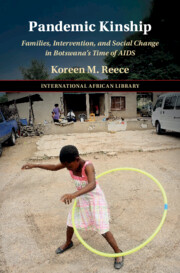Crossref Citations
This Book has been
cited by the following publications. This list is generated based on data provided by Crossref.
Saria, Vaibhav
Das, Veena
Daniels, Benjamin
Pai, Madhukar
and
Das, Jishnu
2023.
The family doctor: health, kin testing and primary care in Patna, India.
Anthropology & Medicine,
Vol. 30,
Issue. 3,
p.
246.
McNeilly, Hannah
2023.
Isabella’s lion: circular care, kinship, and healing in Brazilian Candomblé.
Anthropology & Medicine,
Vol. 30,
Issue. 3,
p.
199.
Nyabundi, Agnetta Adiedo
2023.
From kinship networks to culture of relatedness: a shift of safety nets during health pandemics in the kenyan context.
Frontiers in Public Health,
Vol. 11,
Issue. ,
Zabiliūtė, Emilija
and
McNeilly, Hannah
2023.
Relational chronicities: kinship, care, and ethics of responsibility.
Anthropology & Medicine,
Vol. 30,
Issue. 3,
p.
171.
Végh, Judit
Dúll, Andrea
and
Luu, Lan Anh Nguyen
2023.
Relationship dynamics of trailing spouses before and during a time of crisis.
Journal of Global Mobility: The Home of Expatriate Management Research,
Vol. 11,
Issue. 1,
p.
43.
McNamara, Owen
2024.
“The pandemic came to teach us how to eat”: COVID‐19, mutual vulnerability, and native corn in Oaxaca.
The Journal of Latin American and Caribbean Anthropology,
Vol. 29,
Issue. 1,
p.
81.
Engstrom, Sandra
Reece, Koreen M.
and
Katisi, Masego
2024.
Nature-based therapy in Botswana and Scotland: Re-imagining social work for the climate crisis.
Nordic Journal of Wellbeing and Sustainable Welfare Development,
Vol. 3,
Issue. 2,
p.
116.
Hopkinson, Leo
2024.
Boxing family: Theorising competition with boxers in Accra, Ghana.
Critique of Anthropology,
Vol. 44,
Issue. 1,
p.
21.
Bähre, Erik
and
Gomes, Fabíola
2025.
Responsibilization of care: tensions over health, insurance and the family in Brazil.
Journal of Cultural Economy,
p.
1.



